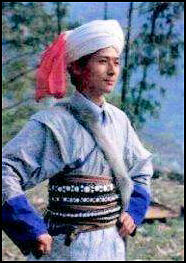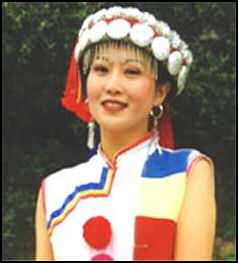LISU FABLE: THE CICADA (BAY-JOO)

Long, long ago, in an era when plants and animals could still talk, there was a deer eating grass in the forest, completely absorbed in the moment. All of a sudden, a cicada burst into vibrant song, startling the deer who bolted off in fright. In her panicked flight, the deer stumbled over a rat's hole. The rat raced out of it's hole and bit into a pumpkin vine, freeing the round squash from the vine. The pumpkin then tumbled down a hill and knocked over a banana tree, which had been serving as home to a little bat. The bat flew off in a start and right into the trunk of an elephant, upsetting the giant creature and causing it to trample the palace of the local king. [Source: hilltribe.com -]
The king, distressed by the disaster before him, asked the elephant why it had trampled his home. The elephant told the king how the bat had flown into his trunk, stirring him into a frenzy. The king then went to the bat and asked it why it had flown into the elephant's trunk. The bat responded that the pumpkin had crashed into his home — the banana tree. The king, continuing down the chain of events, asked the pumpkin why it had rolled down the hill and crushed the banana tree. The pumpkin turned around and asked the king why it was the rat had bit the vine, severing it from its home. The king, unable to answer, went and inquired as to why the rat had decided to bite the pumpkin's vine. The rat protested that it's house (hole) had been trampled by a careless deer. -
The king went off to speak to the deer and finding it asked why it had done such a thing. The deer told of how the cicada had startled it with its shrill morning call. The king turned to the cicada and asked it why it had to sing so loudly. The cicada answered that it enjoyed singing loudly and if the king was not happy with him, then the king should slit him open, take out his liver, kidneys, intestines, and stomach and eat them. Ever since then and to this day, the cicada has somehow lived without any of these essential internal organs. The moral of this story is: Before you decide to do anything, think good and hard before you do it. -
See Separate Articles: LISU MINORITY: HISTORY, LANGUAGE, RELIGION AND FESTIVALS factsanddetails.com ; LISU LIFE AND CULTURE factsanddetails.com
RECOMMENDED BOOKS: “Ethnic Oral History Materials in Yunnan” by Zidan Chen Amazon.com; “Women Not to be Blocked by Canyon” by Yang Guangmin (1995) Amazon.com; “The Lisu: Far from the Ruler” by Michele Zack Amazon.com; “Peoples of the Greater Mekong: the Ethnic Minorities” by Jim Goodman and Jaffee Yeow Fei Yee Amazon.com ; “Lonely Planet Hill Tribes Phrasebook & Dictionary” by David Bradley , Christopher Court, et al. (2019) Amazon.com; “Songs of the Lisu Hills: Practicing Christianity in Southwest China” by Aminta Arrington and Brian Stanley Amazon.com; “Faith by Aurality in China’s Ethnic Borderland: Media, Mobility, and Christianity at the Margins” by Dr. Ying Diao Amazon.com; “Children of the Hills” by Isobel Kuhn Amazon.com; “Run for the Mountains” by Gordon Young Amazon.com
Lisu Story: the King with Long Ears
Long, long ago, there was a king of Indian blood. One day his wife, the queen, gave birth to a baby boy with ears over a foot in length and covered with hair. The queen was afraid the people would discover her son's secret, so she sewed a cap for him to wear over his ears at all times. Years later, as the boy became a teen, his father passed on and the throne was passed on to him, bearing with it all the responsibilities for ruling the nation. The new king, being a young man, loved to dress up and get his hair cut. Each time he had his hair cut, however, the barber would have to be executed to keep his secret from getting out. Little by little, the population of the kingdom began to diminish, until the new king began to realize that, if he continued like this, there would be no barbers left in the kingdom. Finally, as the last barber cut his hair, he decided to take a chance. The king whispered to the barber, "you are prohibited from ever telling anyone what you have seen. If you do tell, it will be on the pain of death." [Source: hilltribe.com -]
 The barber promised to keep the king's secret and he returned home. It wasn't long before the barber began to feel all bottled up inside because he could not tell anyone what he had seen. Finally, one day the barber could no longer take it. His stomach was bulging from trying to hold the secret inside. He walked to the end of the village and dug a small hole into which he let out his secret: "The king has long ears! The king has long ears (Seu pa na bpoo gua lee lee)," he said into the hole. Relieved at being able to get that secret off his chest, the barber buried the secret there in the hole and then walked home happily, his stomach eased, his heart a little lighter, and his breathing back to normal. Soon, however, an Arundo tree sprung up in the spot where the hole had been dug. A villager came over and cut down the tree, making it into a flute. This flute was rather unusual. Instead of sounding out musical notes, it would utter, "the king has long ears! The king has long ears!" -
The barber promised to keep the king's secret and he returned home. It wasn't long before the barber began to feel all bottled up inside because he could not tell anyone what he had seen. Finally, one day the barber could no longer take it. His stomach was bulging from trying to hold the secret inside. He walked to the end of the village and dug a small hole into which he let out his secret: "The king has long ears! The king has long ears (Seu pa na bpoo gua lee lee)," he said into the hole. Relieved at being able to get that secret off his chest, the barber buried the secret there in the hole and then walked home happily, his stomach eased, his heart a little lighter, and his breathing back to normal. Soon, however, an Arundo tree sprung up in the spot where the hole had been dug. A villager came over and cut down the tree, making it into a flute. This flute was rather unusual. Instead of sounding out musical notes, it would utter, "the king has long ears! The king has long ears!" -
When news of this reached the king he ordered the barber to come at once and explain himself. The barber pleaded with the king, explaining to him how he had suffered away in silence, trying not to tell a soul, and filling up with stress and pressure. He explained to the king how he had tried to relieve his suffering by speaking into the hole he dug. The king realized if he were to kill everyone in the kingdom who knew his secret, he would probably have to kill just about everyone, which would leave him without any subjects. Thus, he decided that from that point on he would cease from wearing the cap and would instead reveal his secret to the world for all to see. The moral of this story is: There are no secrets in this world. -
Lisu Ghost and Spirit Stories
According to the story“A Pack of Ghosts (Nee Ga Ga)”: “A long time ago, it was said that each year, during the New Year's festivities, a pack of ghosts (Nee ga ga) would morph into human form and come to dance with the villagers at night. When sunlight broke, however, the nee ga ga would return to their homes and change back to their original form. At night, during the party, the nee ga ga would appear to be the most beautiful people at the party. One year, two young men determined to seize one of the female nee ga ga and hold her captive until morning to see what she really looked like once she had returned to her normal form. When the morning came and the rooster began to crow, all the nee ga ga had snuck back home except one... a lone female who was being held back by two young men. As she watched her friends disappear into the forest she begged and pleaded with her captors to let her go, but they refused. No matter how much she pleaded they would not listen. As the sun came up the woman began to slowly change form; her face wrinkled up and her hair changed color until she became a withered old grandmotherly-looking figure. The two young men were startled by the woman's haggered old appearance and released her. Free, the old woman raced off into the forest and never looked back. That was the last time the ghosts ever came to dance with the villagers. The moral of this story is: Sometimes curiosity can hurt others. [Source: hilltribe.com -]
According to the story “The Spirit of the Banyan Tree (May Joo Nee)”: A long time ago a band of four hunters decided to go out hunting. As night fell they began to look for a place to sleep. One of the four hunters didn't have a protective spell cast to guard him, so he asked to go sleep under the banyan tree where he took betel nut leaves and uttered a spell while blowing over the leaves, casting it upon himself. He asked to be shrunk so he could hide in the tree, which he did once the spell was cast. Around midnight, three ghosts appeared, looking for the spirit of the banyan tree in which the hunter was hiding. They asked the spirit for permission to eat the man who was sleeping in the tree. The spirit of the banyan tree responded he could not give them this man because he had already asked the tree to protect him while he slept. As for the other three hunters, the spirits were free to do as they wished. The spirits responded that this would be impossible as the three hunters were completely covered in sharp thorns. -

The spirit of the banyan tree suggested a plan to trick the three men. One of the three spirits should make the sound of a rooster crowing, another one should pretend to be the sun, and the third spirit could pretend to be sunlight. Satisfied with the plan, the three spirits did as told. Sure enough, when the hunters heard the sound of the rooster and saw the sun rise with its beams lighting up the morning air, they turned off their protective spells and got up. Seizing their chance, the spirits swept in and devoured the three hunters. The spirits took the chest of one of the hunters and gave it to the banyan tree as a gift, leaving it swinging from its branches and above the bed of the hunter sleeping in the tree. In the morning, the hunter woke up to find blood dripping down onto him. Startled, the man lept up and ran for his life back to the village, where he told everyone what had happened. The moral of this story is: When you go into the forest, respect the spirit of the forest and the trees. Each tree and each hill has its own spirit; its own owner. -
Lisu Stories on Destiny, Death and Deception
Once upon a time, and quite some time ago, there was a desperately poor man whose children were still quite small. Distressed, the man contemplated suicide. With rope in hand he set out into the forest to hang himself. Wrapping one end of the rope over a tree branch and the other around his neck, the man took his own life. The man's spirit traveled down to the world of the dead, where he came before the king of the dead. The king of the dead asked the man, "why are you in such a hurry to return? It is not yet your time." The man responded that, "even though it may not have been my time, I wanted to die because I was so desperately poor. That's why I hung himself." The king of the dead listened to the man's story, then told the man, "I am sending you back to the world of the living. It is not your time yet and you are not to come back again until after you have a full head of bristling white hair. This time I will give you everything: money, gold, silver, possessions. You must try to really live this time." After this he set a date for the man to die and sent him back to the world of the living. [Source: hilltribe.com -]
Meanwhile, the man's wife and children, unable to find him, had summoned all the man's brothers, sisters and relatives and formed a search party. They found the man's body hanging from the tree and cut him down. As the man was laid down on the ground his spirit returned to the body. Regaining consciousness, he told all present what had happened to him and why he had decided to hang himself. It wasn't long before the man found his condition improving. He became rich, and prospered in every endeavor he set his mind to. Finally, as the day the king of the dead had appointed for the man to die was fast approaching, the man ordered a large air-tight chamber to be built. He would hide in the chamber and escape death. When the day came when the man was to die, he had himself sealed inside, complete with food and other basic necessities, and had the chamber set afloat on the river. The next day, however, when the chamber was opened, the man was found dead. The moral of this story is: No one can escape death.-

According to the Lisu story “To Be Honest, or to Deceptive?” (Go Ma Ka Dtua Ma Ka): Once upon a time, three friends decided to take a trip to another village. After they had walked for some time they stopped to take a rest in the middle of the road and found some money lying on the ground. Two of the men conjured up a plan to trick the third man out of the money. They suggested a vote should be taken as to which was better: to be honest or to be deceptive. The third friend stated that he thought being honest was better, but the other two men answered that to be deceptive was better. The majority vote was for deceptiveness, making the first two men the winners. They thus refused to share the money they had found with the third man. -
That night they decided to stop and lodge in a village along the way. As they slept, an angel came to the man who had been deceived in a dream. The angel told him that in the village in which they rested there was a princess who was sick and no doctor had been able to treat her. There was a cure, however, and the angel would tell the man just what to do. She instructed him to go out of the city, collect three bundles of firewood and cook a large stone over them. Once the stone had burned it would become a river. With the water from the river the villagers would be able to plant rice and the princess would recover. The next morning the man did as he had been told and everything happened, just as the angel in his dream had said it would. Overjoyed, the king gave a reward to the man for helping his daughter and the village. It wasn't long before the man's two friends heard the news and came to see for themselves. They asked the third man how he had managed to be so fortunate. The man explained, "I am an honest person; goodness has been bestowed upon me. And how about the two of you? Didn't the two of you say you thought it was better to be deceptive? How did things end up like this?" Then the man laughed out loud with obvious delight. The moral of this story is: Honesty will always have more than enough; deceptiveness will not prosper for long. -
Lisu Story: The Spirit House (Ah Bpa Mo Hee)
A long time ago, there were two sisters who grew up together in a quiet little village. As they grew into fair young ladies, a man from another village came and asked to marry the older sister. After the wedding, she followed with tradition and went off to live with the man and his family. As time passed on, the younger sister began to really miss her older sister. It had been a long time since they had seen each other and the younger sister had never gone to see the older sister's new home, so she decided to set out to visit her. Upon reaching the village, the villagers informed her that her sister had married a spirit (fee feu). [Source: hilltribe.com -]
Not knowing whether to believe the villagers, she went to see for herself. The frightening rumour proved to be true and after staying with her older sister for two or three days, the younger sister asked nervously to go home. As it was late, it was decided that she should return to her home village the following day. The next morning, the younger sister offered to make breakfast for her older sister before setting out for home. As she went outside to collect firewood for cooking the food she overheard her sister praying to go home with her sister. She followed the sound of the voice and peered around the wall to see her sister squatting over a pile of cabbage, pumpkin, and cucumber seeds finishing the prayer. The older sister turned around and saw her younger sister who pretended to be oblivious to what had just happened. The younger sister continued to bring the firewood into the house and to start to make a fire, just like normal. The older sister stopped her younger sister and told her she was going to give her some seeds to take back with her to plant at home. -

Lisu village
Upon hearing this, the younger sister became quite startled. She was afraid her sister would be angry if she didn't accept the seeds, but if she took them she was afraid the spirit — her sister's husband — would possess her body. The sister thought for a minute, then took the cloth turban from her head and used it to wrap the seeds up in. Her hands shaking, she took the seeds and bade her sister farewell. As she was traveling back down the road on her way back home she came upon a river and, acting as if she were thirsty, went down to the edge of the water to take a drink. Reaching the river bank, she took the cloth head wrap and tossed it into the river where it got caught up in the roots of a tree in the middle of the river. Not looking back, she set off as fast as she could for home. Later, a wedding parade came marching through the area and down to the river's edge. The paraders were about to cross the river when the spirit in the cloth warned the attendants not to cross the river. "At this exact moment," the spirit in the cloth said, "the spirit of the river is waiting to devour you. Wait and I will tell you when it is safe to cross." Once the currents had changed a little and the spirit of the river had disappeared, the spirit inside the cloth told the paraders it was safe to cross. -
From that point onwards the spirit in the cloth would give helpful warnings to all the travelers that passed that way, saving them from danger and disaster on the waters of the river. One day, an old man came wandering through and, as usual, the spirit warned the man it was not safe to cross because the spirit of the river was going to eat him. "Just at this moment the spirit of the river is boiling some water and is coming to get you soon. If you just wait, I will tell you when the spirit of the river has passed." The man waited patiently and sure enough, after some time, the spirit in the cloth announced it was now safe to cross. Hearing this, the man felt a rush of gratitude for the kindness which this spirit had showed him and he told the spirit how wonderful he thought the spirit was for helping people like this. The man said he wanted to take the spirit back with him, where he would build him a house to live in at the end of the village. The spirit could help the people of his village, bringing peace and tranquility to the people. If someone was ill and did not know why, that person could come to the spirit to seek advise. The people would bring pigs and chickens to pay homage to the spirit and the spirit would respond. Whether it was a male or female chicken, boiled or fresh, the spirit would give his messages to the people through chicken bones. Whatever needs the people brought to the spirit, the spirit would have to help them. -
Thus, it was decided, and everyone in the village pitched in to help build a house for the spirit. When the house became old and decayed, a new one was built. To this day these houses are known as "ah bpa mo hee" (spirit houses). As for the two sisters, the younger sister never went back to visit her older sister, thinking she was still living with the spirit. Likewise, the older sister never went to visit her younger sister, thinking she must now be possessed by the spirit. Both sisters were afraid of the other, neither one knowing the truth, and each thinking the worst had happened. Thus, they both lived out the rest of their lives and died, separate and alone, never having seen each other again. -
Image Sources: Nolls China website, Joho maps, Wikimedia Commons
Text Sources: 1) “Encyclopedia of World Cultures: Russia and Eurasia/ China”, edited by Paul Friedrich and Norma Diamond (C.K. Hall & Company; 2) Liu Jun, Museum of Nationalities, Central University for Nationalities, Science of China, China virtual museums, Computer Network Information Center of Chinese Academy of Sciences, kepu.net.cn ~; 3) Ethnic China *\; 4) Chinatravel.com chinatravel.com \=/; 5) China.org, the Chinese government news site china.org | New York Times, Lonely Planet Guides, Library of Congress, Chinese government, National Geographic, Smithsonian magazine, PBS Frontline, Wikipedia, BBC, CNN, and various books, websites and other publications.
Last updated September 2022
